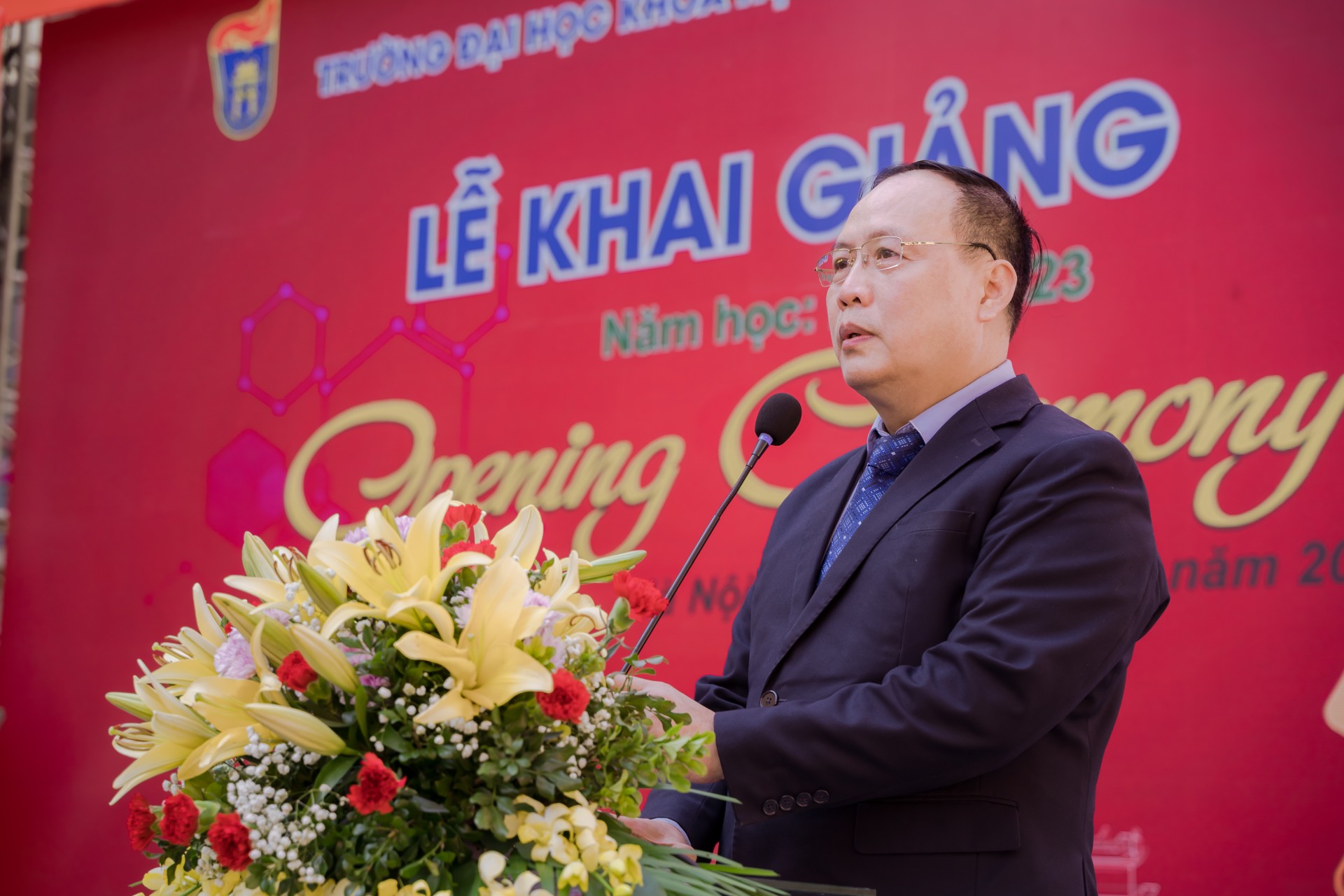Prof. Dr. Nguyen Dinh Duc speaks at the Opening Ceremony of the new academic year 2022-2023 of the University of Social Sciences and Humanities
Professor Nguyen Dinh Duc, can you briefly introduce the newly issued University Training Regulations of VNU?
The new regulations include 9 chapters and 51 articles regulating undergraduate training at Hanoi National University, including: training programs; training organization and management; scientific research of students; rights and obligations of lecturers, academic advisors, and students; testing, examination and assessment of learning outcomes; graduation recognition.
This regulation applies to units and individuals participating in the university training process in the full-time form and the part-time form at Hanoi National University, including: training program and study time; training organization and management; scientific research of students; rights and obligations of lecturers, academic advisors, students; testing, examination and assessment of learning outcomes; graduation recognition.
Currently, the university training organization and management system consists of two levels: Hanoi National University level and training unit level.
To maximize the exploitation of all resources and the combined strength of the units, the new Regulations are consistent and imbued with the “one-VNU” viewpoint and philosophy. Vietnam National University, Hanoi is responsible for directing and uniformly operating the organization and management of training according to the open, interconnected, linked and cooperative mechanism between training units; Coordinating the use of common resources (human resources, facilities - technology, equipment) for training; At the same time, Vietnam National University, Hanoi is responsible for comprehensively managing the organization and management of training of affiliated schools/faculties.
Training units are responsible for organizing and managing training in majors and courses assigned by Hanoi National University; recognizing student learning outcomes between training units; student learning outcomes accumulated at partner schools through student exchange; developing shared learning materials. In addition, building new majors and new training programs, focusing on interdisciplinary training programs, reporting to the Director of Hanoi National University for review and appraisal, issuing decisions to open majors, approving programs and assigning training organization tasks.
So what are the important new points in the Regulation that need to be noted, Professor?
Some notable points in the new training regulations of Hanoi National University such as issuance time and enrollment quota assignment.
Specifically, every year, based on the conditions for ensuring quality, social needs and the situation of students having jobs in their field of study after graduation, the training unit shall develop enrollment targets for each major, each training form with the corresponding training program of the following school year, and report before December 31 to and request the Director of Hanoi National University for approval.
Lecture halls HT1, HT2 of VNU at Hoa Lac campus
Based on this proposal, as well as common resources and development orientation, the Director of Hanoi National University decides to assign enrollment quotas to training units before March 1st every year and reports to the Ministry of Education and Training. After the decision to allocate enrollment quotas by Hanoi National University is made, training units will be notified to organize enrollment and training.
Regarding enrollment organization, every year, based on the general regulations of the Ministry of Education and Training, the Director of Hanoi National University issues a separate instruction document on enrollment work, applicable at Hanoi National University.
Regarding the structure and volume of the training program: For the standard training program, it is designed to have at least 120 accumulated credits for bachelor's training, 150 accumulated credits for engineer training, 155 credits for pharmacist training and at least 205 credits for doctor training; The high-quality training program is designed to have at least 15 more credits than the corresponding standard training program, on the basis of improving and adding some subjects, referring to foreign training programs or on the basis of the training program of a prestigious advanced university in the world that has been adjusted in accordance with the regulations of Hanoi National University; The talent training program is designed to have at least 30 more credits than the corresponding standard training program, on the basis of improving and adding some subjects with higher level requirements and broader and deeper content, referring to prestigious foreign training programs. Dual major programs, in collaboration with foreign educational institutions, awarded degrees by Vietnam National University, Hanoi, are designed according to regulations of Vietnam National University, Hanoi.


However, it should be noted that the newly issued regulations do not consider changing majors for students who have studied from the second year. The learning results of the accumulated credits of students changing majors or training forms will be considered for retention and recognition as equivalent to the credits in the new major.
The new regulations also continue to facilitate and allow students to study two training programs at the same time in the form of full-time training - and this is also an attractive strength for candidates of a multi-disciplinary, multi-field university like Hanoi National University. However, the conditions for studying the second major are supplemented with stricter regulations: Specifically, students must have studied at least two semesters of the first training program, and if the average score of all subjects from the beginning of the course to the time of registration for the second training program is 2.0 or higher, the student must meet the admission requirements of the second program in the year of enrollment; if it is 2.5 or higher, the student only has to meet the input quality assurance threshold of the second program in the year of enrollment.
Professor Nguyen Dinh Duc, what is your assessment of this new Regulation?
The newly issued regulations on undergraduate training at Hanoi National University have updated new points in the Ministry's regulations, and at the same time have many new points to improve training quality and create more favorable conditions for learners than before.
The Regulations are an important legal corridor for the use and mobilization of the common resources of the entire National University. The new Regulations promote decentralization and delegation of authority to units; give autonomy and responsibility to heads of training units, while maintaining the core mechanisms and values for operation and promotion, creating a combined strength to maintain the brand and training quality of Hanoi National University.
This Regulation takes effect from the date of signing, i.e. October 21, 2022, and applies to courses enrolling from 2022 onwards. Previous regulations contrary to this Regulation are hereby repealed.
Thank you very much Professor!

.jpg)

